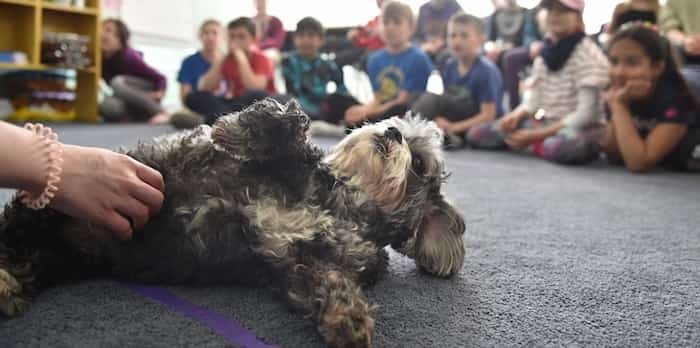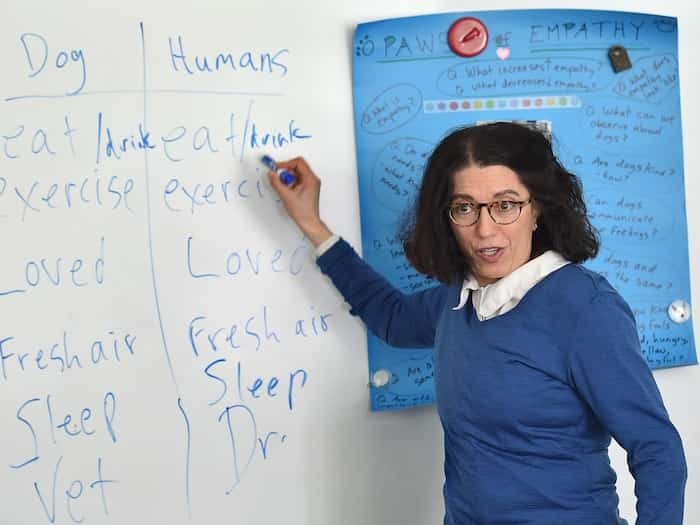 With the help of 12-year-old Leila, Vancouver animal lawyer Victoria Shroff teaches a program called “Paws of Empathy” to elementary school students across Metro Vancouver. Photograph By DAN TOULGOET
With the help of 12-year-old Leila, Vancouver animal lawyer Victoria Shroff teaches a program called “Paws of Empathy” to elementary school students across Metro Vancouver. Photograph By DAN TOULGOET
Leila is not your typical rock star.
Though surrounded by people who pine to touch her, Leila doesn’t crave the mass attention or the amped-up emotions of her admirers.
Be calm, don’t grab or pick her up and be kind towards her. These are the first lessons imparted over an hour-long discussion led by Vancouver animal law lawyer Victoria Shroff.
“Let’s think about how we want to be treated, how we want to treat dogs and how we want to treat all creatures,” Shroff says moments into the discussion.
It’s worth noting at this point that Leila is a 12-year-old bichon frise/shih tzu mix and her admirers are a group of nine and 10 year olds at Kitsilano’s Henry Hudson elementary.
Shroff is on hand on a late April morning to build upon a program she calls Paws of Empathy. It’s her 10th lesson at a Metro Vancouver school, where she speaks with elementary-aged kids about animal ethics and animal law and, of course, animal empathy. Shroff is one of the first and longest-serving animal law practitioners in Canada and she’ll lead animal law courses at UBC this fall.
Shroff’s lessons weave through universal truths that apply not only to dogs, but to people, other animals and the Earth itself. Parallels are drawn between a person or a dog’s need for exercise, food and drink, and medical care.
“They also need to be loved,” said one student.
“That’s a huge one,” Shroff responds.
 Vancouver animal lawyer Victoria Shroff teaches a program called “Paws of Empathy” to elementary school students across Metro Vancouver – Dan Toulgoet
Vancouver animal lawyer Victoria Shroff teaches a program called “Paws of Empathy” to elementary school students across Metro Vancouver – Dan Toulgoet
Humour enters the picture when students are asked why they shouldn’t scare animals and particularly Leila in this case, as she’s surrounded by 20-plus enthusiastic onlookers.
“Because she can’t go into court and bark and defend herself,” one young whippersnapper says.
It’s the second time during the lesson the student plays on Shroff’s standing as a lawyer.
“You’re very litigious today,” Shroff responds.
The kids are asked for pledges to show empathy and the responses that come back are all over the place: offers to help siblings with homework, to give money to a homeless person or cook dinner for the family.
Shroff then works her message into the kids’ everyday curriculum.
Students need to use their math skills to calculate the amount of dog food needed in a month and how those portions will be allocated. Science comes into play as students talk about Leila’s curious nature, wandering about the classroom. Social studies and humanities are reflected when kids list the jobs dogs do: helping the visually impaired or others living with post-traumatic stress disorder and police dogs.
As the morning winds down, pearls of wisdom are imparted around sharing and avoiding jealousy. A jar with an uneven amount of candy is produced and the class is tasked with divvying it up. One student suggests the extras go to Courier photographer Dan Toulgoet.
Shroff leaves the class asking kids to once again pledge to their furry friends, their families and themselves.
“You start with one person being kind … don’t wait for somebody else to make the first move in being kind,” Shroff said. “You can be that person, you can show that empathy.”



